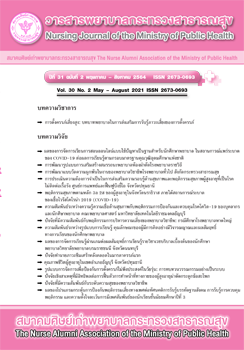The Development of Work Engagement Scale for Professional Nurses in General Hospitals under the Ministry of Public Health
Main Article Content
Abstract
This study aimed to develop a scale of work engagement for professional nurses in General Hospitals under the Ministry of Public Health and to validate the model . The participants consisted of 420 professional nurses in General Hospitals under the Ministry of Public Health randomly selected using multi-stage sampling. Data were collected using a questionnaire of work engagement for professional nurses. Data were analyzed using factor analysis with principle component and Varimax rotation. Construct validity was analyzed using a software package program. The results showed that a scale of work engagement for professional nurses in General Hospitals under the Ministry of Public Health consisted of four factors: 1) Enthusiasm, 2) Vigor, 3) Dedication, and 4) Absorption, including 23 items with factor loading of .54-.80 and accounted for 54.02 % of total variance. The measurement model of work engagement for professional nurses in general hospitals under the Ministry of Public Health was consistent with the empirical data with Chi-square=267.67, df=192, χ2/df= 1.39 GFI=.94, AGFI=.92, RMSEA=.03. This research can be used as a guide to develop research tools of work engagement for professional nurses in other hospitals under the Ministry of Public Health. However, content validity should be evaluated for context in each hospital prior to the use this tool.
Article Details
บทความและรายงานวิจัยในวารสารพยาบาลกระทรวงสาธารณสุข เป็นความคิดเห็นของ ผู้เขียน มิใช่ของคณะผู้จัดทำ และมิใช่ความรับผิดชอบของสมาคมศิษย์เก่าพยาบาลกระทรวงสาธารณสุข ซึ่งสามารถนำไปอ้างอิงได้
References
.
2. Van Bogaert P, Peremans L, Van Heusden D, Verspuy M, Kureckova V, Van de Cruys Z, et al. Predictors of burnout, work engagement and nurse reported job outcomes and quality of care: a mixed method study. BMC nursing 2017;16(1):1-14.
3. Schaufeli WB, Bakker AB, Salanova M. The measurement of work engagement with a short questionnaire: a cross-national study. Educational and Psychological Measurement 2006;66(4):701-16.
4. Kahn WA. Psychological conditions of personal engagement and disengagement at work. Academy of Management Journal 1990;33(4):692-724.
5. May DR, Gilson RL, Harter LM. The psychological conditions of meaningfulness, safety and availability and the engagement of the human spirit at work. Journal of Occupational and Organizational Psychology 2004;77(1):11-37.
6. Schaufeli WB, Salanova M, González-Romá V, Bakker AB. The measurement of engagement and burnout: a two sample confirmatory factor analytic approach. Journal of Happiness Studies 2002;3(1):71-92.
7. Maslach C, Leiter MP. The truth about burnout: how organizations cause personal stress and what to do about it. San Francisco, CA: John Wiley & Sons;2008.
8. Schaufeli WB, Bakker AB. UWES Utrecht work engagement scale: preliminary manual [internet]. Occupational Health Psychology Unit: Utrecht University;2004 [cited 2020 14 September] Available from: https:// www.wilmarschaufeli.nl/publications/Schaufeli/Test%20Manuals/Test_manual_UWES_English.pdf
9. Phoungrak L, Srisatidnarakul B. Development and psychometric validation of nurse’s work engagement scale, private hospital in Bangkok. Journal of The Royal Thai Army Nurses 2017;18 Supplement 48-57.(in Thai). 10. Schaufeli WB, Bakker AB. Job demands, job resources, and their relationship with burnout and engagement: a multi sample study. Journal of Organizational Behavior: The International Journal of Industrial, Occupational and Organizational Psychology and Behavior 2004;25(3):293-315.
11. Ministry of public health. Health resources geographic information system [internet]. The ministry of public health;2020 [cited 2020 14 September]. Available from: http://gishealth.moph.go.th/healthmap/gmap.php.
12. DeVellis R. Scale development: theory and applications 4th ed. Thousand Oaks (CA): Sage Publications;2016.
13. Sinjaru T. Research and statistical data analysis with SPSS. Bangkok: V. Inter print;2007.(in Thai).
14. Srisatidnarakul B. Nursing research methodology. Bangkok: U & I Inter media;2007.(in Thai).
15. Tabachnick BG, Fidell LS, Ullman JB. Using multivariate statistics. MA: Pearson Boston;2007.
16. Cooper-Thomas HD, Paterson NL, Stadler MJ, Saks AM. The relative importance of proactive behaviors and outcomes for predicting newcomer learning, well-being, and work engagement. Journal of Vocational Behavior 2014;84(3):318-31.
17. Bakker AB, Demerouti E, Lieke L. Work engagement, performance, and active learning: the role of conscientiousness. Journal of vocational behavior 2012;80(2):555-64.
18. Chutchawanchanchanakij K. Management factors affecting the retention of scarce professional nurse in regional hospitals under the supervision of the public health permanent secretary office. [Dissertation]. Bangkok: Management Graduate Schools, Siam University;2017.(in Thai).

